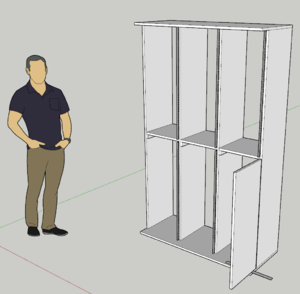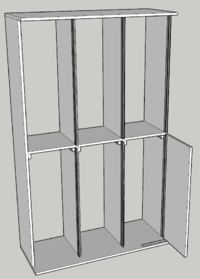Project:Lockers
| ProjectInfoBox building lockers for our members | |
|---|---|

| |
| Status: | in progress |
| Release Date: | Oct 2017 |
| Initiator: | Lukas, Ciaran, Patrick, Mitja |
| Team: | Ed, Moritz |
| Materials Used: | plywood ("Elliotis pine"), wood screws, piano hinges, brackets |
| Tools Used: | circular saw, table saw, smoothing plane, sandpaper, cordless drill, surform plane, rasps, Japanese saw |
| Software Used: | SketchUp |
We are building a bunch of lockers for our common room! Design files created with SketchUp "Make" can be found here and are released under the Creative Commons "Attribution - Share Alike - Non-Commercial" license.
Vertical Approach

The first prototype ("v1") consists of six lockers arranged in a 3 × 2 pattern, all in one frame.
pro:
- few individual boards
- pretty close to the minimum amount of wood needed for lockers this size
con:
- large boards to handle
- large contraption, difficult to transport later on
- cleats holding the floors waste a bit of space
- floors need to be secured from top and bottom to avoid tampering
Notes on Construction
The doors should be hung once everything else is in place as the long boards used tend to shift throughout the build. It also turned out that calculated sizes do not always work out as the thickness of the plywood sheets varies by up to 2 mm.
Horizontal Approach

Ciaran proposed an alternative design during the making of the first "vertical" prototype which will be the second one we try.
pro:
- smaller individual boards
- smaller units - easier to move to a new location one day
- no space lost with cleats
con:
- more pieces to assemble
- "double floor" requires more wood and wastes more space than cleats would
Latch Hardware
Locking is possible by connecting the holes of a bracket and a matching piece of flat steel, e.g. with a padlock. Members can of course get creative and operate their locker with any number of over-engineered fancy setups ;-)